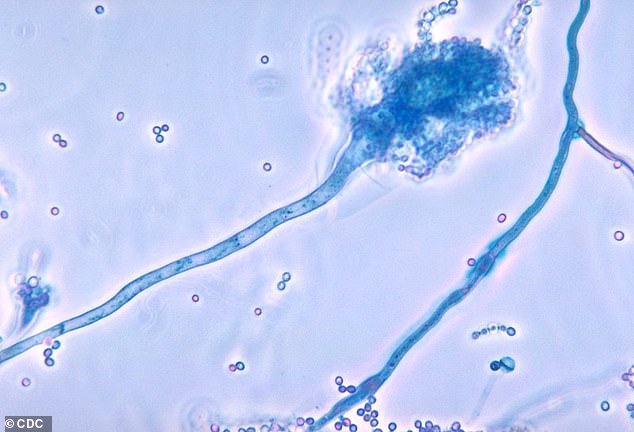Scientists warn about fungus that is 90% deadly in some groups and has been found in backyards across America
Scientists have discovered a deadly, drug-resistant fungus hiding in common garden soil, compost and flower bulbs.
A team of researchers tested these garden products against a resistant strain of Aspergillus fumigatus, a type of infectious fungus previously found only in Europe.
They found levels high enough to infect gardeners with weakened immune systems, such as those with lung disease or those undergoing chemotherapy.
Researchers have discovered a deadly, drug-resistant fungus hiding in commonly used garden materials including soil, compost and flower bulbs.
When inhaled, A. fumigatus can grow in the lungs and cause an infection called aspergillosis.
A. fumigatus is usually treatable with antifungal medication. But a strain that is resistant to treatment is spreading throughout Europe.
Now it seems it has also originated in the US.
Research has shown that A. fumigatus causes more than 300,000 illnesses worldwide each year, with a mortality rate of 30 to 90 percent.
In patients with weakened immune systems, the risk of death is nearly 100 percent if the infection is left untreated or is resistant to antifungal drugs.
According to the Mayo Clinic, symptoms include fever, coughing up blood or mucus plugs, and worsening asthma.
But “if you have a healthy immune system, it’s not a problem,” Dr. Michael Mansour, an infectious disease expert at Massachusetts General Hospital who treats patients with weakened immune systems, told the Boston Globe.
“Our immune cells will eat them,” he said.
Researchers from the University of Georgia collected 525 samples of soil, compost, flower bulbs and other plant products from farms across the US.
They tested every sample for the drug-resistant strain of A. fumigatus and 24 tested positive.
The study did not identify which types of compost were most likely to contain the resistant variant, nor which commercial sources were most likely to sell it.
But the results suggest that levels are particularly high in imported flower bulbs.
The emergence of resistant A. fumigatus is likely driven by the widespread use of antifungals in agriculture to control crop diseases, the researchers said in their report.
However, more research is needed to determine how widespread this fungal disease is in the US and to identify the hotspots where the disease is most prevalent.
People with weakened immune systems should be careful and wear a mask and gloves while gardening to protect themselves from spores, experts warn.
A. fumigatus breaks down organic matter. For this reason, it is often found in compost piles and leaf piles, where it thrives on the heat released by decomposition.

Aspergillus fumigatus is a deadly fungal disease that can infect the lungs of people with weakened immune systems when inhaled.
Many people who garden regularly inhale the spores on a daily basis because they disturb the soil while gardening and the spores become airborne.
“It’s virtually ubiquitous in the environment,” study author Marin Talbot Brewer, a professor of mycology and plant pathology at the University of Georgia, told the Boston Globe.
This is known to cause problems in people with weakened immune systems, such as those with lung disease and chronic obstructive pulmonary disease, patients who have recently had an organ transplant, and patients undergoing chemotherapy.
According to the Mayo Clinic, in these populations, aspergillosis can spread quickly from the lungs to the brain, heart, kidneys, or skin and can be fatal.
Mansour told the Boston Globe that this infection is common among his patients, but it is especially prevalent in people who garden regularly and do not take precautions such as wearing masks and gloves.
He also saw cases of moisture problems among people who recently participated in a renovation project.
According to him, most of these cases responded to treatment.
Previous studies have shown that resistant A. fumigatus occurs in agricultural materials.
The University of Georgia study is the first to test whether this fungal disease can spread through plants and garden products available in the U.S.
